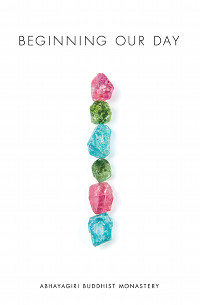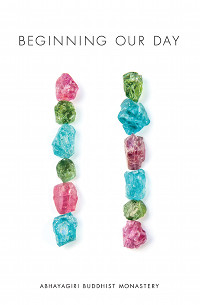Blown Into Cosmic Dust
Ajahn Pasanno

The Buddha encouraged us to contemplate aging, sickness, and death every single day. It’s essential that we make an effort do that, because the mind’s nature is to forget about these contemplations. It inclines away from them and instead, inclines toward thoughts of eternal youth and health. For the most part, death doesn’t exist for us. So we have to make it conscious in our practice by realizing the limitations of the human condition on the physical level. We’re bound to this body that’s constantly aging. Even when we’re young, it’s still aging. The reason a baby gets born in the world is because it’s too old to stay in the womb. That aging process continues on after birth.
This is a supportive reflection for us—it’s not intended to make us miserable or depressed. It’s intended to bring up wholesome mental states to counteract the mind’s tendency toward pamāda—being careless and not very circumspect regarding the truths of our existence. The three recollections on aging, sickness, and death help establish a sense of heedfulness and spiritual urgency. We have this opportunity to hear the Dhamma, to study the Dhamma, to practice the Dhamma, to live a life in accord with the Dhamma. Reflecting on that makes us grateful for this opportunity to practice and that’s vital, because it’s easy to let the opportunity slip by.
We recollect the nature of the human body—that our lives are subject to aging, sickness, and death. For all of our seeming solidity, we’re left to nature when we die—our bodies dissipate and disappear. The Buddha taught the charnel ground contemplations, which encourage us to examine the body’s process of dissolution after death. It changes shape, bloats, disintegrates, and dries out until just the sinews and bones are left. The bones are then scattered until there’s little remaining but a small pile of gray dust. Then a wind comes along and blows it here and there until there is nothing left. For all of our obsessions about ourselves—our worries, fears, and anxieties around health and physical well-being, and all the uncertainties in our lives—it is absolutely certain that, on a physical level, we’re all going to be blown into cosmic dust.
Now when we contemplate that fact, it’s not to be picked up in a nihilistic way, but rather with the sense of urgency that’s needed to establish the heart with skillful spiritual qualities—the sense of urgency we need to keep attending to our actions of body, speech, and mind, so that they’re conducive to clarity, wisdom, and wholesome states of mind.
We often recite the “Five Subjects for Frequent Recollection.” When reciting the fifth, we recollect: “I’m the owner of my kamma, heir to my kamma, born of my kamma, related to my kamma, abide supported by my kamma. Whatever kamma I shall do, for good or for ill, of that I will be the heir.” These recollections help us establish our kamma—our actions of body, speech, and mind—in what is wholesome, skillful, and beneficial, in what bears fruit in terms of peace and clarity, happiness and well-being. So it behooves us to take responsibility for these contemplations, to reflect upon them and develop them in our practice.
This reflection is from the newly released two part collection of Dhamma Reflections:





